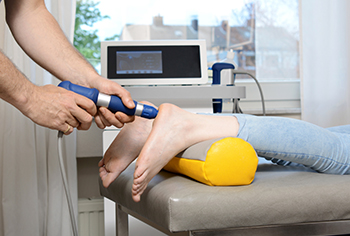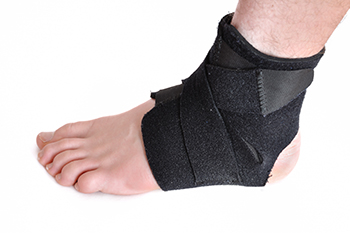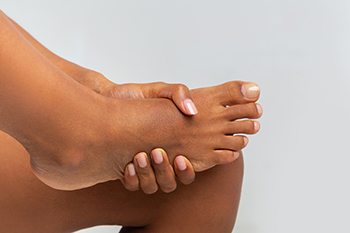

Shock wave therapy for plantar fasciitis is a non-invasive medical treatment designed to alleviate the excruciating heel pain caused by plantar fasciitis. Plantar fasciitis is a condition that is characterized by inflammation of the plantar fascia, a thick band of tissue connecting the heel bone to the toes. This inflammation results in stabbing pain, especially with the first steps in the morning. Shock wave therapy, also known as extracorporeal shock wave therapy, or ESWT, involves the application of high-energy shock waves to the affected area. These shock waves stimulate the body's natural healing processes by increasing blood flow and promoting tissue repair. Additionally, shock wave therapy may break down the calcium deposits that can form in the plantar fascia. This treatment is typically administered over several sessions, and its effectiveness varies from person to person. While it is considered safe, consulting a podiatrist is crucial in determining if shock wave therapy is the right choice for managing your plantar fasciitis. If you are interested in learning more about shockwave therapy, it is suggested that you confer with this type of doctor who can provide you with the information you are seeking.
Shockwave therapy is a treatment commonly used to treat various injuries and conditions, particularly plantar fasciitis in the feet. To learn more, consult with Dr. Edward D. Hutson from Easton, PA. . Our doctor can provide the care you need to keep you pain-free and on your feet.
Shockwave Therapy
Shockwave therapy is a new treatment option designed to treat bone conditions such as tennis elbow, shoulder pain, and others. Shockwave therapy uses high intensity sound waves that are directed to the affected tissues of the body with pinpoint accuracy. The effects are very beneficial, leading to a production of collagen fibers, eliminating inflammation.
Who Benefits from Shockwave?
Shockwave is recommended for patients suffering from heel pain and associated problems. Heel pain is a common condition which can be caused by obesity, overexertion, and spending a substantial amount of time on hard floors with your feet exposed and unsupported.
Fast and Easy
The therapy is actually a simple process that can leave patients feeling better the very next day. Shockwave therapy is not as dramatic as it sounds. It enables more blood flow to effected areas, addressing the source of the problem and allowing treatment to last for a long time.
Treatment & Recovery Time
Shockwave treatment will enable your feet to recover quickly. This is especially important since surgery is not required. It is cost effective and does not require the use of anesthesia. This treatment is a better option to surgery, since it is proven safe.
If you have any questions, please feel free to contact our offices located in Easton, and Northampton, PA . We offer the newest diagnostic and treatment technologies for all your foot and ankle needs.

Ankle instability can be a persistent and troublesome issue for many people, affecting their daily activities and overall quality of life. It often arises due to a variety of factors that compromise the stability of the ankle joint. One common cause of ankle instability is a history of ankle sprains. When an ankle is sprained, the ligaments that support it may stretch or tear, weakening its ability to hold the joint in place. Muscle weakness is another contributing factor, as insufficient strength in the muscles surrounding the ankle can increase the joint’s instability. Additionally, certain medical conditions, such as ligament laxity and joint hypermobility, can predispose individuals to ankle instability. Improper footwear choices, especially high heels or shoes lacking adequate support, can also strain the ankle joint over time. Finally, biomechanical issues like overpronation or supination can create an imbalance, which further increases the risk of ankle instability. If you're experiencing ankle instability, it is suggested that you make an appointment with a podiatrist for a personalized assessment and guidance on managing your condition.
Ankle pain can be caused by a number of problems and may be potentially serious. If you have ankle pain, consult with Dr. Edward D. Hutson from Easton, PA. . Our doctor will assess your condition and provide you with quality foot and ankle treatment.
Ankle pain is any condition that causes pain in the ankle. Due to the fact that the ankle consists of tendons, muscles, bones, and ligaments, ankle pain can come from a number of different conditions.
Causes
The most common causes of ankle pain include:
Symptoms
Symptoms of ankle injury vary based upon the condition. Pain may include general pain and discomfort, swelling, aching, redness, bruising, burning or stabbing sensations, and/or loss of sensation.
Diagnosis
Due to the wide variety of potential causes of ankle pain, podiatrists will utilize a number of different methods to properly diagnose ankle pain. This can include asking for personal and family medical histories and of any recent injuries. Further diagnosis may include sensation tests, a physical examination, and potentially x-rays or other imaging tests.
Treatment
Just as the range of causes varies widely, so do treatments. Some more common treatments are rest, ice packs, keeping pressure off the foot, orthotics and braces, medication for inflammation and pain, and surgery.
If you have any questions, please feel free to contact our offices located in Easton, and Northampton, PA . We offer the newest diagnostic and treatment technologies for all your foot care needs.

Pressure ulcers are a significant concern in healthcare. These wounds develop due to prolonged pressure on the skin, often affecting individuals with limited mobility or those with underlying health conditions. Pressure ulcers can also result from reduced blood flow to the skin. Any break in the skin caused by pressure can lead to infection. Common infections related to pressure ulcers include localized infections, cellulitis, and osteomyelitis, which can progress to sepsis, a life-threatening condition. Prolonged pressure reduces blood flow to the skin, which can result in tissue damage. Foot pressure ulcers often occur on bony prominences such as the heels and ankles. People using improperly fitted prosthetics, those who wear shoes that rub on various parts of the foot, and people with fragile skin are more susceptible to these wounds. Early detection and treatment are essential for better outcomes. Daily foot checks can help detect pressure ulcers and result in timely intervention. If the skin breaks, vigilance should be practiced for signs of infection, such as pus, foul odor, and increased redness. Once a pressure ulcer forms, treatment includes wound cleaning, protection from pressure, and other medical care depending on the severity of the ulcer. If you have a foot wound, it is strongly suggested that you make an appointment with a podiatrist as quickly as possible for treatment.
Wound care is an important part in dealing with diabetes. If you have diabetes and a foot wound or would like more information about wound care for diabetics, consult with Dr. Edward D. Hutson from Easton, PA. . Our doctor will assess your condition and provide you with quality foot and ankle treatment.
What Is Wound Care?
Wound care is the practice of taking proper care of a wound. This can range from the smallest to the largest of wounds. While everyone can benefit from proper wound care, it is much more important for diabetics. Diabetics often suffer from poor blood circulation which causes wounds to heal much slower than they would in a non-diabetic.
What Is the Importance of Wound Care?
While it may not seem apparent with small ulcers on the foot, for diabetics, any size ulcer can become infected. Diabetics often also suffer from neuropathy, or nerve loss. This means they might not even feel when they have an ulcer on their foot. If the wound becomes severely infected, amputation may be necessary. Therefore, it is of the upmost importance to properly care for any and all foot wounds.
How to Care for Wounds
The best way to care for foot wounds is to prevent them. For diabetics, this means daily inspections of the feet for any signs of abnormalities or ulcers. It is also recommended to see a podiatrist several times a year for a foot inspection. If you do have an ulcer, run the wound under water to clear dirt from the wound; then apply antibiotic ointment to the wound and cover with a bandage. Bandages should be changed daily and keeping pressure off the wound is smart. It is advised to see a podiatrist, who can keep an eye on it.
If you have any questions, please feel free to contact our offices located in Easton, and Northampton, PA . We offer the newest diagnostic and treatment technologies for all your foot care needs.

Your feet can reveal vital insights about your overall health. Often overlooked, they serve as a unique barometer for your well-being. Foot pain is a key sign that something is amiss. Frequent foot cramping can signal dehydration or nutritional deficiencies. A sore that will not heal might be a sign of diabetes causing nerve damage in the feet. These wounds can go unnoticed and lead to severe complications. Swelling, pain, and enlargement of the big toe may indicate issues such as gout, inflammatory arthritis, infection, or trauma. Heel pain may be indicative of plantar fasciitis, often caused by footwear choices or a strain on the ligament supporting your arch. If you have foot pain of any sort and you are not sure of its source or how to get relief, it is suggested that you make an appointment with a podiatrist at your earliest convenience.
Foot Pain
Foot pain can be extremely painful and debilitating. If you have a foot pain, consult with Dr. Edward D. Hutson from Easton, PA. . Our doctor will assess your condition and provide you with quality foot and ankle treatment.
Causes
Foot pain is a very broad condition that could be caused by one or more ailments. The most common include:
Diagnosis
To figure out the cause of foot pain, podiatrists utilize several different methods. This can range from simple visual inspections and sensation tests to X-rays and MRI scans. Prior medical history, family medical history, and any recent physical traumatic events will all be taken into consideration for a proper diagnosis.
Treatment
Treatment depends upon the cause of the foot pain. Whether it is resting, staying off the foot, or having surgery; podiatrists have a number of treatment options available for foot pain.
If you have any questions, please feel free to contact our offices located in Easton, and Northampton, PA . We offer the newest diagnostic and treatment technologies for all your foot care needs.